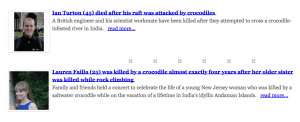MyDeathSpace, cold data, and digital hauntings
The top horror story of all time on Reddit’s NoSleep forum is about a redditor who has been receiving ghostly Facebook messages from his dead girlfriend. Based on its Reddit rating at least, the story is a successful meta-modern re-imagining of a long literary tradition of haunting/possession narrative, and a fairly scary one at that, mainly because nobody needs ghosts to get better at doing ghost things. But it’s also simply about a guy being terrified by cryptic strings of words and not much else. Or, more specifically, having a deeply disturbing encounter with some hidden force or xenologic hidden in the coldness of language. Texts have always been weirdly haunted, necrotic things with inhuman properties. Most telling of those unsettling properties and the weirdness of all texts is how we anthropomorphize them: we conflate them with their authors, we engage with them, give them identities, and speak of them as doing things; we voluntarily bestow texts with presence and give them power over us by letting them define and actualize human culture. But to anthropomorphize them is also to recognize that despite the fact that texts seem to come from within something about them registers as nonhuman, infinitely exterior to us–a distance that requires personification and naturalization. Such attention to the inhuman, quasi-alien, and even undead operations of language certainly isn’t new: Benjamin spoke of texts as monstrous voids in “The Task of the Translator,” in which “meaning plunges from abyss to abyss until it threatens to become lost in the bottomless depths of language” (4); Paul de Man, in his own forbidding way, flirted even more dangerously with a nihilistic understanding of the mechanics of language when he wrote that when we talk about “the fundamental non-human character of language, one also speaks of the fundamental non-definition of the human as such, since the word doesn’t correspond to anything like that” (96); even gentle Derrida developed a spectral logic of text and media while, less surprisingly, Martin “life of the party” Heidegger devotes several sections of Being and Time to musings about the weird ontology of language, as though there is an irreducible difference between beings and their words.
The frightening but also potentially emancipative possibility is that there might not be any difference. Emancipative in the sense that questioning whether we really are more or differently alive and human than our machinic and chemical processes as well as our discursive practices ungrounds new economies of being in the world or at least radically opens up the conceptual regimes through which we apprehend the weirdness this being in and of language entails. The leap I’m making here is that if what Jockers terms the “event horizon” of mass digitization forces us “to ask an entirely new set of questions about literature and the literary record” those questions end up going well beyond the scope of literary criticism or academia in general (4). What does it mean that language is inimical to life, especially in light of our helpless dependency on language systems to draft, order, and manage world-space and ourselves in it? How does this destabilize not just our position as readers, interpreters, or scholars but threaten the very grammar and sacred textuality of the human? Jockers’ reflection that “massive digital corpora offer us unprecedented access to the literary record and invite, even demand, a new type of evidence and meaning making” namely calls to mind Foucault’s dark prophecies in The Order of Things. Arguably, traditional modes of reading are already self-dissipative practices that find us enmeshed in human-nonhuman assemblages, speak to the discursive nature of the human project, and to our strange desire to disappear into the void of our textual descriptions and prescriptions. But mass digitization and the mechanical readings of texts this makes possible not only open up new ways to think about text in terms of data-objects but also new forms of subjectivity, erasing and redrafting humankind’s self-portrait. At the same time, our excessive diffusion into cold data accelerates our confrontation with the idea that humankind is but “a face drawn in the sand,” as Foucault put it–that perhaps we have never been human, and that such a possibility requires new logics (387).
Thinking about the kind of life (or rather unlife) data has is a productive way to grapple with an inhuman logic that may have always legislated and contaminated the human project. The Reddit story is visibly playing with how social media is increasingly revising our understanding of presence, materiality, temporality, and spatiality with experimental ecologies of being but, even more fundamentally, it implodes our definitions of what constitutes human life (and death) with the afterlife of data. This is the line of inquiry that eventually drew me to the ethically controversial site of MyDeathSpace, a virtual graveyard of the user profiles (turned plots) of dead MySpace members.
MyDeathSpace launched in 2006 and perhaps a little too neutrally bills itself as simply an “archival site of obituaries of MySpace members, linking to their MySpace pages.” It’s the kind of site that naturally invites a host of questions about the ethics of media: are there things that shouldn’t be catalogued? Is MyDeathSpace a form of memorialization, data preservation, or plain desecration? Is it redefining the way we grieve? But more importantly, at least in the context of this probe, how does it mobilize data or keeps it alive in such a way that repudiates traditional notions of what human life is and supplants them with a far more spectral, undead logic? What if a logic of decay, of coldness, of anti-creativity and negation is what we find at the bottom of our (eventually total) transmutation into text and data?
Granted, what I actually spent most (all) of my time doing on MyDeathSpace was searching for weird causes of death like these:
Turning morbid curiosity into an instructive practice appears to be partially what MyDeathSpace creator Mike Patterson intended his death archive to do, at least according to a 2007 Salon article that quotes him as claiming he “created the site to teach teens a “lesson” about risky behaviors.” Did I need to be reminded to avoid cancer, car accidents, murder, crocodiles, and hot air balloons? Not really. Still, the way MyDeathSpace quantifies the death causes of MySpace users has undeniable shock value. Lessons about watching how hard I laugh aside, another terrifying aspect of MyDeathSpace is that it’s less of a death space than a haunted one: a procession of ghostly data where neither dead account holders nor commenters seem more biologically alive or dead than one another. In fact, the strange pathology at play here is that a new form of life emerges from the negation of the host-body behind the account data–death has turned those MySpace members into open-source selves entirely generated by and rooted in text and object form, as though in erasure there is narrative continuation and a becoming (or vanishing into) of one’s textual trace sustained by the archive, its administrators, and forum members. There is something both disturbing and liberating in the idea that our texts and/or data outlive us and assume a separate autonomy. Then again, a site like MyDeathSpace raises a very Foucauldian question of whether or not we are ever more than textual bodies or simply hosts to the antihuman logic of texts.
References
Benjamin, Walter. “The Task of the Translator.” The Translation Studies Reader. Trans. Harry Zohn. London: Rouledge, 2000.
de Man, Paul. Resistance to Theory. Manchester: Manchester University Press, 1986.
Foucault, Michel. The Order of Things. New York: Random House, 1970.
Jockers, Matthew L. Macroanalysis: Digital Methods and Literary History. Chicago: University of Illinois Press, 2013.



